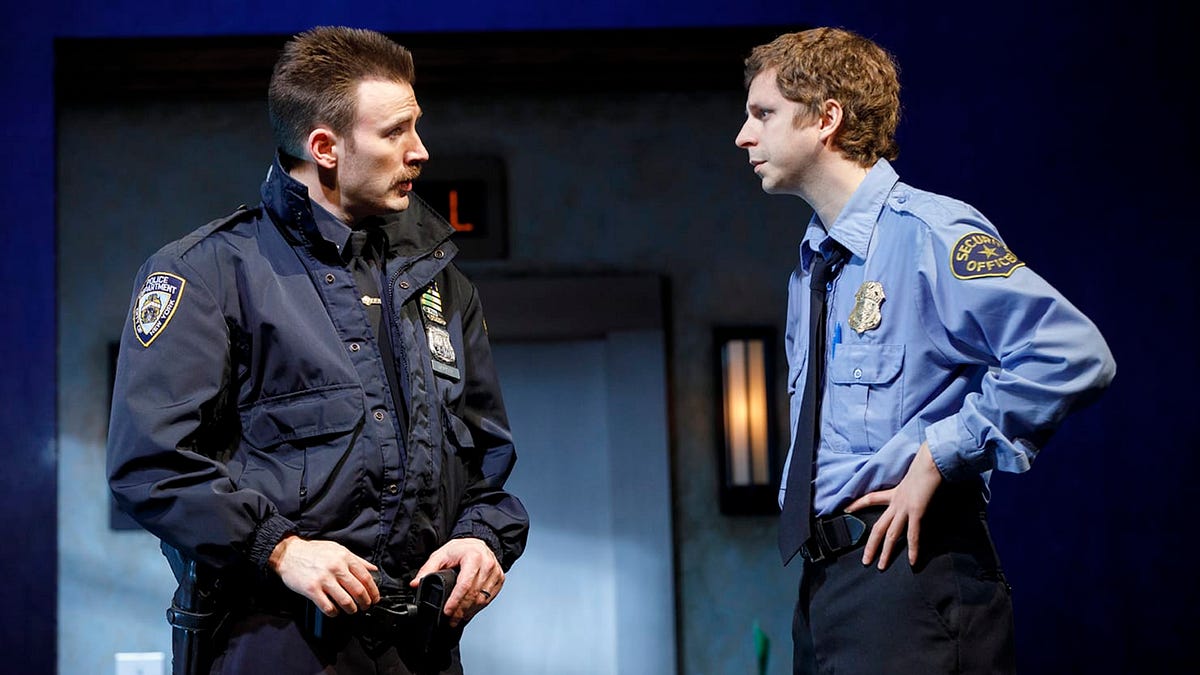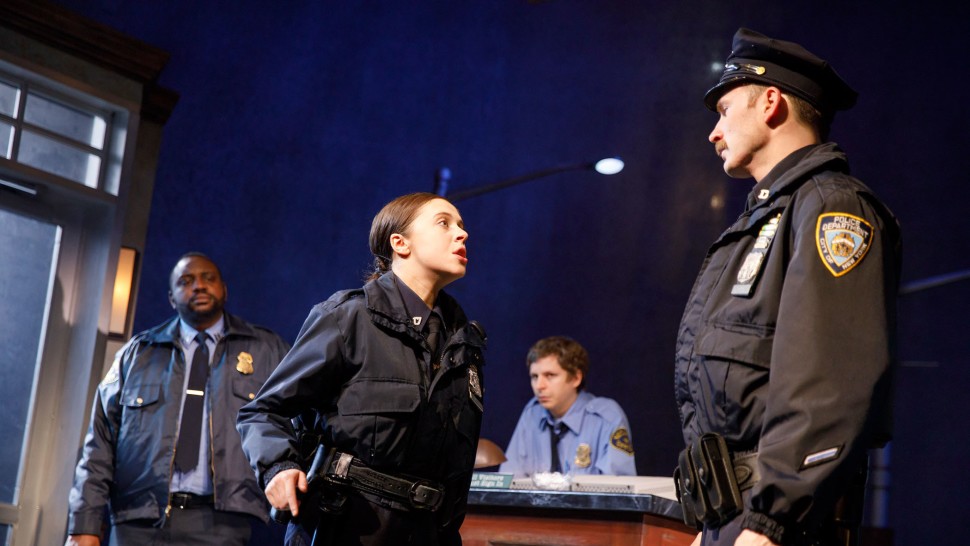A revival of Kenneth Lonergan’s “Lobby Hero” marks the inaugural production of Second Stage’s Broadway season at the newly renovated Helen Hayes Theatre — and what a debut. Although the play is from 2001, when it premiered off-Broadway, nothing about the piece feels dated. This revival proves how little has changed in these seventeen years.
“Lobby Hero,” tells the story of Jeff, a security guard (don’t you dare call him a doorman) for an apartment building in New York City. During one of his graveyard shifts Jeff (Michael Cera), encounters his boss William (Brian Tyree Henry), a womanizing police officer, Bill (Chris Evens), and his rookie female partner, Dawn (Bel Powley). Everything may begin banal and boring — not much happens in apartment lobbies in the middle of the night — but soon turns into a quiet but intense evening of ethical dilemmas, blackmail, perjury, and sexual assault.
The play asks several important questions about authority and truth, power and duty, right and wrong. Who are we supposed to protect? Who gets to decide when the rules apply? Are there times when we don’t need to follow the letter of the law?
Is William allowed to lie to the police to give his brother an alibi? Should Dawn report Bill for having sex while on duty, even if she may lose her job? Does Bill get to sleep with Dawn in exchange for sticking up for her in a review hearing?
Amidst all these ethical quagmires is Jeff, sitting at his security desk. Perhaps the most central question of the play is what duty does Jeff have to tell the truth — about everything. Should he report William for lying, Bill for blackmailing and sexual harassment, Dawn for police brutality, or should he just keep quiet and do his job?
The play may be from 2001, but the issues feel somehow more relevant now. It seems almost impossible that “Lobby Hero” is not a byproduct of #BlackLivesMatter and #MeToo. At the core of the piece are issues of racial profiling, police brutality, misuses of power, workplace sexual harassment, and rape. The fact that this play predates both recent movements, and yet still feels so accurate, proves how little progress has been made in the last seventeen years and how much work there is to be done.

Something about Longeran’s style is a bit awkward, a bit forced; it takes a little while for the actors and the audience to ease into it, but once they do it all clicks. Through some piece of thoughtful playwrighting, it all works. He merges serious issues and biting comedy; he crafts quirky characters that are somehow annoying and yet deeply human and relatable. The text of the play does most of the work in making this production a success.
On the other hand, the director, Trip Cullman, does not seem to ever overcome the awkwardness. The blocking often felt very forced and stagey, with actors looking uncomfortable and unnatural. On the whole, Cullman did not choose to make and bold statements or choices, most tragically by not ending the play with a definitive statement about Jeff’s future. Will he always be “just a guy in a lobby” or will he finally leave and reach for something more meaningful?
David Rockwell designed the set, the lobby that Jeff never leaves, a solitary square that rotated unnecessarily around the stage. Overall this felt a bit gimmicky, a slightly desperate attempt to make the play more dynamic, to provide a bit of action in an almost plotless play.
Despite the weak direction and spinning set, the cast was certainly endearing. Cera played Jeff very within his acting style, but it was quite effective; he managed to find the comedy, the tragic longing, and the deep ethical confusion within the character. The other celebrity from the screen to appear in the play, Chris Evans, also surpassed expectations, although he had a much easier role, defined exclusively by misogyny and a mustache. Tyree gave a powerful performance, providing a deep critique of class and race in the justice system. Powley cames off as the least experienced of the four, but she managed to hold her own and very emotionally confronted sexual harassment and the threat of rape from Evan’s character, Bill. Together, the quartet of actors worked strongly together, although almost the entire play is various combinations of two-person scenes.
“Lobby Hero” is not a flashy play. Like so many other plays this season, it has some celebrities in it. But unlike many other shows currently running, “Lobby Hero” forces its audience to reevaluate their morals, to think back to all the ethics lessons they ever learned, to question their beliefs on race, class, duty, authority, the law, the police, and sexual assault; it makes you think. “Lobby Hero” may be from 2001, but a Broadway revival of it in 2018 — and one that feels equally relevant — is a wake-up call: no more sleeping on the job, it is time to make some changes.






